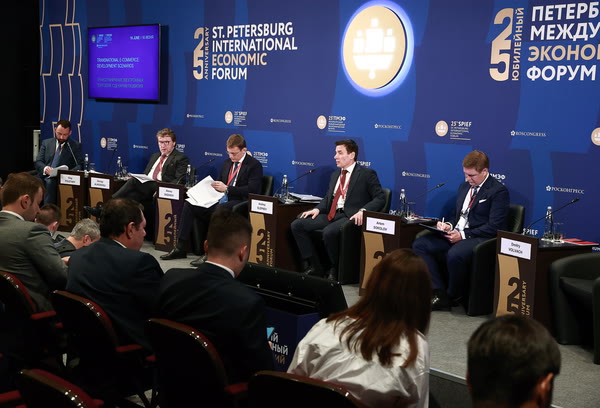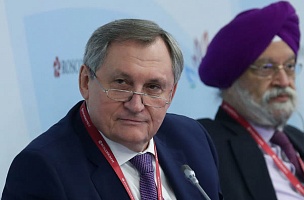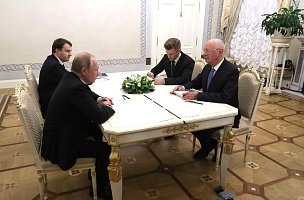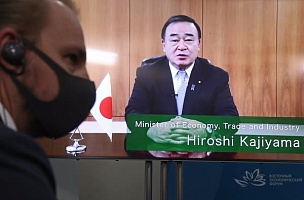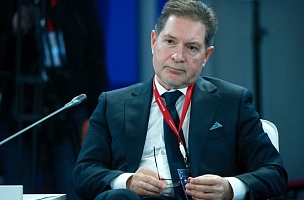Key conclusions
E-Commerce involvement grows together with its social importance
“If you look at the level of involvement in e-commerce, it seems like we have great growth rates... there are major players in the market. But then we consider the fact that we do not have more than 10% share of e-commerce, and compare it to China and the UK, where the share is reliable 25–27%, we understand that we are still waiting for our sustainable growth,” Dmitry Volvach, Deputy Minister of Economic Development of the Russian Federation.
“First and foremost, we can see that we have radically different trends in domestic e-commerce and cross-border trade. If you look over the years, cross-border trade was falling. At its peak, there was a monthly [drop] of up to four times. Now it has leveled, but still [in relation to] last year we have half the volume of cross-border trade,” Andrey Slepnev, Member of the Board, Minister in Charge of Trade, Eurasian Economic Commission.
“E-commerce also plays a serious social role. For example, for customers in small towns and rural areas in 2020–2021, e-commerce was essentially the only way to get goods from a number of leading brands. In other words, this industry plays a big social role,” Dmitry Volvach, Deputy Minister of Economic Development of the Russian Federation.
In times of sanctions marketplaces play an important role supplying the domestic market
“The restrictions that were imposed at the beginning of 2022, as well as the disruption of transport chains, highlighted the problem of replenishing the domestic market with everyday goods. Accordingly, policy priorities of the Russian government have changed. Undoubtedly, the number one priority in these conditions was to fill the domestic market with everyday goods,” Alexey Sazanov, State Secretary – Deputy Minister of Finance of the Russian Federation.
“I think that marketplaces will be the main suppliers of these products and the main beneficiaries of these circumstances. <...> If at some point one of the brands suddenly decides to come back to Russia, which it had previously left for one reason or another, it will probably still have to fight economically for its place under the sun. Because this place will most likely already be occupied by other logistics chains, by substitute products. Normal market processes will be at work here. It is the abundance of these goods and the logistics which marketplaces provide, that will allow the market equilibrium to be restored fairly quickly,” Dmitry Volvach, Deputy Minister of Economic Development of the Russian Federation.
“The issue of meeting consumer demand (meaning accessibility, and not only physical when some goods are in short supply, but also accessibility in terms of price) is much more effectively resolved by high-tech companies. They are flexible in terms of managing their stocks, their pricing policy, their customers,” Andrey Slepnev, Member of the Board, Minister in Charge of Trade, Eurasian Economic Commission.
PROBLEMS
Lack of emphasis on SMEs that can adapt rapidly to the new reality
“Traditional retail is still focused on large importers... who, due to the fact that they carry large shipments can not rebuild their logistics chains as quickly as small businesses, who carry small shipments. In these conditions, online commerce plays an invaluable role. A large number of small companies work there alongside large companies, they are certainly much more flexible, they adapt faster to the changing conditions. Here, in order to saturate the domestic market, emphasis was placed on this sector. The most important step for proper stabilization was, of course, to increase the threshold for importing goods to one thousand euros – in other words, to go back to the conditions that existed in 2019,” Alexey Sazanov, State Secretary – Deputy Minister of Finance of the Russian Federation.
“As for the cross-border trade products from third countries, it is clear that there are problems with payments, problems with logistics, and problems with the sites and companies themselves. Some platforms decided not to serve Russia at all,” Andrey Slepnev, Member of the Board, Minister in Charge of Trade, Eurasian Economic Commission.
Double VAT is a barrier for cross-border trade
“What problems can we expect? First of all, it is data issues: relocation, localization. Here we need to regulate everything related to personal data... so that there are no problems and no barriers. The second problem, which we will probably talk about today, is VAT. <...> Double taxation. This has also become a barrier – and more than that – a discriminatory barrier, even in comparison to third countries. This problem must be resolved,” Andrey Slepnev, Member of the Board, Minister in Charge of Trade, Eurasian Economic Commission.
“Regarding the fact that VAT is paid twice. Yes, indeed, after colleagues from Kazakhstan and Belarus began to impose VAT on goods sold by websites, double taxation indeed occurs,” Alexey Sazanov, State Secretary – Deputy Minister of Finance of the Russian Federation.
SOLUTIONS
E-commerce could be revolutionized by departing from invoices towards digital registry records
“Transition to electronic databases, which are now used by the tax services of the Republic of Kazakhstan, and providing access to these databases to other members of the Eurasian Economic Union will allow to move away from paper copies, including electronic invoices. It will make it easier for exporters and importers to document a fairly wide range of commodities,” Dmitry Volvach, Deputy Minister of Economic Development of the Russian Federation.
“Electronic documents and everything that goes with them – mutual recognition of electronic digital signatures, a trusted third party that could validate the digital signature of any of the five countries, electronic waybills, electronic acts of acceptance and transfer – ideally we should abandon these documents altogether and just switch to registry entries. This requires technological solutions,” Artem Sokolov, President, The Association of Internet Trade Companies.
“What I am most interested in now is whether we can move to a logic of regulation based on technology, i.e. to move away from invoices altogether, move away from waybills, and move to registry records. This is a revolutionary step. <...> We expect our colleagues to help us, we will try to make this step,” Andrey Slepnev, Member of the Board, Minister in Charge of Trade, Eurasian Economic Commission.
Bonded warehouses set to appear in Russia. The experiment may start in the autumn.
“We can start approving bonded warehouses in Kaluga Region, Moscow Region, and Kazan. The sites are ready. We assume that we [will be] the operator for bonded warehouses. The Post is also developing its core infrastructure in a harmonious way. We are opening new automated centres in Novosibirsk, Samara, Khabarovsk. We are harmoniously developing the entire infrastructure across the country and renewing our fleet,” Georgy Alikoshvili, Deputy Commercial Director, Russian Post.
“We will make every effort to ensure the adoption of this bill by the end of the spring session, so that the experiment with bonded warehouses will be launched in the autumn,” Alexey Sazanov, State Secretary – Deputy Minister of Finance of the Russian Federation.
For more information, visit the Roscongress Foundation’s Information and Analytical System roscongress.org.


